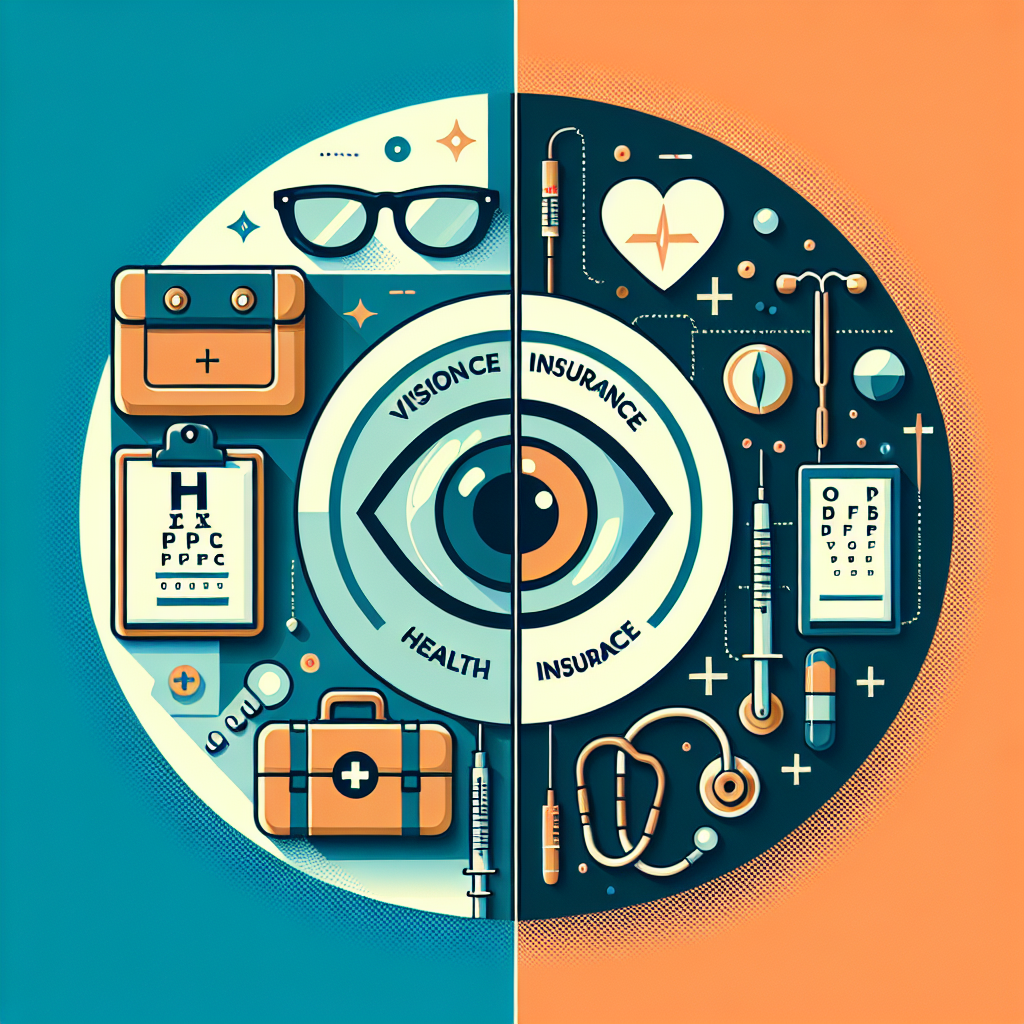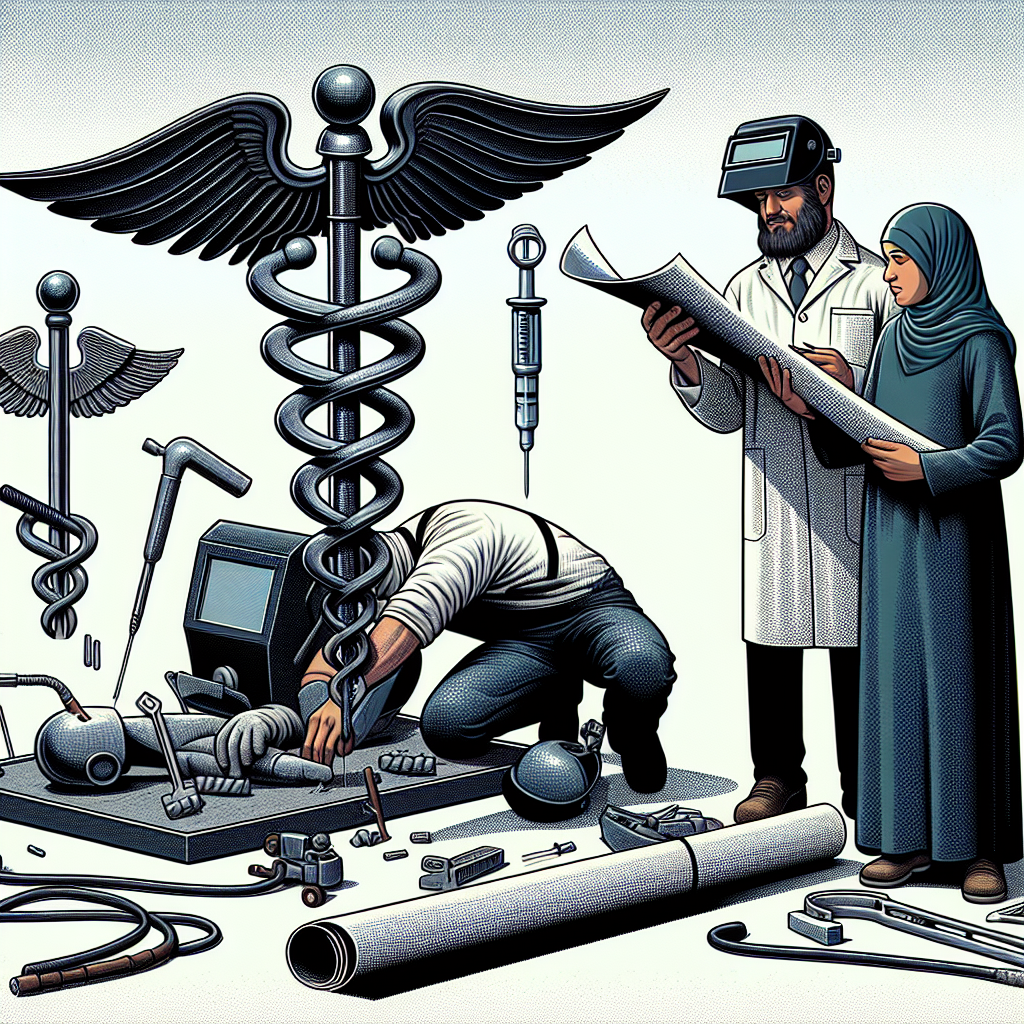Filed under Health Insurance on
Vision Insurance vs Health Insurance: Key Differences

When navigating the world of insurance, it’s crucially important to understand the distinctions between different types of coverage. Two common forms of coverage that people often confuse are vision insurance and health insurance. While both are integral to maintaining overall wellness, they serve distinct roles with specific benefits. In this article, we will explore the fundamental differences between vision insurance and health insurance, clarifying how each can benefit you. Plus, we’ll address commonly asked questions to broaden your understanding of these essential insurance types.
Vision Insurance: An Overview
Vision insurance is a specialized type of agreement that focuses exclusively on eye care. It generally covers routine preventive eye care, such as eye exams and corrective eyewear, including glasses and contact lenses. Vision insurance is typically supplementary, meaning it is often offered as an add-on to broader health insurance plans.
What Does Vision Insurance Cover?
- Eye Exams: Regular eye exams are critical for detecting eye conditions and assessing general vision health. Vision insurance commonly covers an annual eye exam.
- Corrective Eyewear: Most plans include discounts or allowances for prescription glasses and contact lenses.
- Discounts on LASIK and Other Procedures: Some vision insurance plans may offer discounts on corrective surgeries like LASIK, but they typically do not cover full surgery costs.
It’s important to note that vision insurance plans vary, meaning coverage may differ based on the insurer and the specific plan chosen. Policyholders should carefully review their plans to understand the coverage details.
Health Insurance: An Overview
Health insurance, unlike vision insurance, offers a comprehensive cover for a wide range of medical expenses. It is designed to protect you financially from the high costs associated with unexpected illnesses, injuries, and certain preventive services.
What Does Health Insurance Cover?
- Doctor Visits and Hospital Stays: Most health insurance plans cover a portion of the costs for visiting doctors and hospital admissions.
- Emergency Services: Coverage for emergencies, which may include ambulance services, ER visits, and critical care, is a standard feature.
- Prescriptions: Health insurance covers prescription medications, usually with a copay system or through prescription coupons.
- Preventive Services: Many plans cover preventive services like vaccinations and annual physicals at no additional cost.
Health insurance plans can be intricate, often requiring an understanding of deductibles, copayments, and networks of providers. Policyholders should always delve into the specifics of their health plan to ensure they are adequately covered.
Key Differences Between Vision Insurance and Health Insurance
While vision insurance and health insurance both play essential roles in maintaining good health, they serve different purposes and include different provisions. Here are key differences and practical insights to navigate these insurance types:
Scope of Coverage
The most distinct difference is the scope of coverage. Vision insurance is narrow, focusing solely on eye health and related expenses. Health insurance is broad, covering a wide spectrum of medical needs. For example, if you require an eye exam to update your glasses prescription, vision insurance is applicable. However, should you need treatment for a vision condition like glaucoma or macular degeneration, health insurance largely takes over to cover medical treatments and associated consultations.
Cost and Premiums
Vision insurance tends to have lower premiums compared to health insurance, as it covers a more limited range of services. However, people who have consistent eye care needs, such as yearly glasses or contacts, may find the investment in vision insurance worthwhile due to the savings on routine eye care expenditures.
In contrast, health insurance premiums can vary significantly based on factors like age, location, and coverage level. Given its comprehensive nature, it's generally more expensive but offers protection against high-cost medical events.
Utilization
Vision insurance is most beneficial for individuals who require frequent eye care, such as routine exams or updated glasses and contact lenses. For these individuals, the cost savings on eyewear and exams are substantial compared to paying out-of-pocket.
Health insurance is a catchall for numerous health-related scenarios ranging from preventive services to surgery. For instance, it’s the go-to coverage when you need to manage conditions like diabetes, heart disease, or require surgery for a medical emergency.
Real-life Example
Consider Jane, a working professional who wears glasses and occasionally uses contacts. She visits an optometrist annually and updates her lenses regularly. Jane would benefit from a vision insurance plan that offers free eye exams and savings on new glasses and contacts.
Conversely, take the example of John, who was recently diagnosed with a chronic condition. John’s health insurance will be primarily responsible for covering his doctor's visits, necessary medications, and any surgeries. While he might also have vision insurance for general eye care, his primary concern is comprehensive medical coverage for his ongoing health needs.
Making the Right Choice
Selecting the appropriate insurance coverage depends greatly on personal needs and circumstances. If your primary concern relates to overall health, including potential emergencies or ongoing conditions, health insurance should be your priority. However, if you or your family members need frequent eye exams or corrective lenses, then adding vision insurance might be a beneficial supplement.
- Evaluate Your Needs: Consider if you require regular eye care, or if your primary concerns relate to general health services.
- Check Your Employer’s Options: Many employers offer both health and vision insurance as part of their benefits packages, often at discounted rates.
- Review and Compare Plans: Always compare different plans, focusing on premiums, coverage, provider networks, and specific benefits to get the best value.
FAQs About Vision Insurance and Health Insurance
1. Can I have both vision and health insurance?
Yes, many people have both types of insurance. Vision insurance is often a supplementary plan that complements health insurance, providing comprehensive coverage for both general medical needs and specific eye care requirements.
2. Does health insurance cover eye injuries?
Generally, health insurance will cover eye injuries because they are considered a medical condition, rather than a routine vision care issue. It's crucial to check the specific terms and plans of your health insurance provider for detailed coverage information.
3. Is vision insurance worth the investment?
If you have regular eye care needs, such as yearly exams or need frequent updates to your prescription glasses or contact lenses, vision insurance can be a financially smart decision. It often reduces out-of-pocket costs for these common needs.
4. Will vision insurance cover surgery for cataracts?
Vision insurance typically does not cover surgical procedures such as cataract surgery. This type of medical procedure is more often included under health insurance, as it's considered a medical necessity rather than routine eye care.
5. Are eye exams covered under health insurance?
Routine eye exams are usually not covered under health insurance as they are considered preventive vision care. These would generally be covered under a vision insurance plan. However, if the eye exam is considered necessary due to a medical condition, health insurance might cover it.
In conclusion, distinguishing between vision insurance and health insurance is essential for making informed decisions that align with your health care needs. Both have their distinct place, working together to offer a rounded approach to health and wellness.





